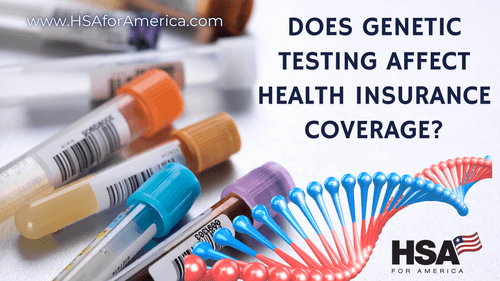However, this raises important legal and ethical concerns.

Genetic Testing and Insurance
Genetic testing can offer valuable insights into your health. It can help identify risks for certain conditions, such as breast cancer, or determine whether you may pass genetic disorders to your children. While these benefits are clear, many people don’t stop to consider where their genetic data goes, how it’s stored, or who might access it.
There are serious ethical and societal issues at stake. One major concern is ensuring that corporate or government entities don’t misuse genetic information against consumers.
How Genetic Testing Affects Insurance Coverage
It’s currently legal for life, long-term care, and disability insurance carriers to discriminate against applicants on the basis of their genetic information.
That is, if your medical records show that you have a genetic marker that puts you at elevated risk of developing breast cancer, for example, they can turn you down for coverage.
In this post, we’ll discuss the major legal and ethical issues surrounding widespread genetic testing. You’ll also learn how to take steps to protect your genetic information or prevent it from being used against you when you apply for insurance coverage in the future.
Compare Pricing on the Best Insurance Plans Available
The Genetic Information Nondiscrimination Act (GINA)
In the United States, the Genetic Information Nondiscrimination Act (GINA) offers some protections.
Specifically, under GINA, health insurance companies and employers are prohibited from discriminating on the basis of genetic information.
That’s good news—but there’s a catch: The law doesn’t extend these restrictions to life insurance, long-term care insurance, or disability insurance carriers. In those areas, these types of insurance carriers could use this information to deny you these important types of coverage.
Furthermore, if your genetic information is included with your other medical records, it will be accessible to all insurance companies that practice medical underwriting. Insurance companies routinely review medical records before making coverage decisions.
This could lead to higher premiums or outright denial of coverage.
Remember: Once genetic information is disclosed, it cannot be “undisclosed.” Other than health insurance underwriters, Insurers have the right to ask for this information, and failure to provide it can result in policy cancellations or claims denials.
The good news: Once a policy is in force, insurance carriers can’t revoke coverage just because new genetic information on you becomes available. As long as you keep paying your premiums on time, your coverage will remain in force according to the terms of the contract.
Summary of GINA Protections
| Type of Insurance | Protected by GINA? | Can They Use Genetic Information? |
|---|---|---|
| Health Insurance | Yes | No |
| Life Insurance | No | Yes |
| Disability Insurance | No | Yes |
| Long-term Care Insurance | No | Yes |
Direct-to-Consumer Genetic Testing and Insurance Privacy
Before you submit a sample to a direct-to-consumer genetic testing service, such as AncestorDNA and 23andMe, read their company’s privacy policies.
Some companies share data with third parties. These may include include insurers, or vendors that may sell your data to insurers.
Protecting your genetic privacy is critical for protecting your ability to purchase coverage in the future.
Apply for Insurance Before Genetic Testing
While GINA and the Affordable Care Act both prohibit some forms of discrimination on the basis of medical records, there are important differences to understand.
The ACA bans health insurance carriers from discriminating against people with pre-existing conditions or on the basis of their genetic information. However, the ACA only applies to major medical insurance. It doesn’t apply to life insurance, disability insurance, or long-term care coverage.
If you plan on applying for these types of policies in the future, consider applying before you send that saliva sample off to 23andMe. Or even before you submit to genetic testing on a doctor’s advice.
That way, you’ll know that your genetic information is still a secret. Insurance carriers will have no opportunity to use this information against you.
Once your life, long-term care, or disability policies are in place, your genetic test results won’t impact your existing coverage. It can only affect future applications.
Practical Tips for Protecting Your Insurability
| Tip | Description |
|---|---|
| Apply for Coverage First | Secure life, disability, and LTC insurance before testing |
| Know Your Rights | Understand what GINA protects and doesn’t |
| Review Privacy Policies | Check the terms of genetic testing services |
| Consult an Expert | Speak with an insurance professional for advice |
| Be Honest | Provide accurate information to insurers |
Get Insurance Coverage In Place Now
It’s never too early to put important protection in place against unexpected death, disability, or the need for long-term care.
And if you’re in good health, it’s more affordable than you think. Especially when you’re relatively young.
For a free consultation and individualized quotes, just contact an HSA for America Personal Benefits Manager. We can quickly gather information, help you identify your coverage needs, and help you compare the different insurance policies available to you.
So you can get coverage in place before there’s any risk of your genetic information harming your approval chances.
Compare Pricing on the Best HealthShare Plans Available
Protecting Your Insurability and Privacy
Genetic testing holds exciting potential and is already saving lives.
However, be strategic about sharing your genetic information.
Before submitting DNA for testing, make sure you have life, disability, and long-term care insurance in place. Once those policies are active, insurers cannot revoke them based on new genetic findings.
If you’ve been waiting to secure the protection against financial catastrophes you need, don’t wait. Your health could change at any moment. Contact a Personal Benefits Manager today, and get your personal insurance protection in force.
For Further Reading:



